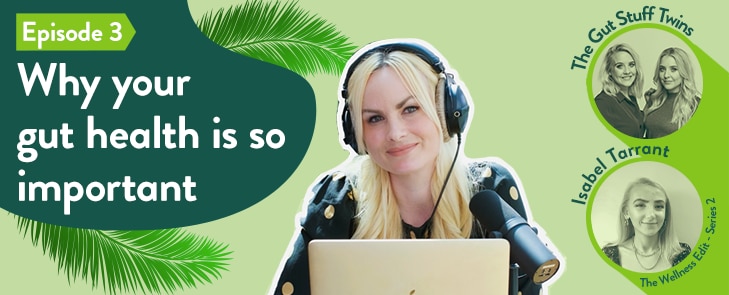10% off £35
Digestion: The only overview you need

From feeling butterflies to stomach ache, your digestive system has a big impact on your wider wellbeing. Understanding how it works is the first step to staying well.
From the boom in friendly bacteria supplements to ‘free from’ supermarket aisles, we’re increasingly interested in our digestive wellness.
And no wonder – 40% of us have at least one digestive issue, such as indigestion, at any one time.1
Yet, how many of us really know what’s going on in the full nine metres of our digestive tract.2
It’s time to find out!
What is the digestive system?
Although we eat food, our digestive system doesn’t absorb food – it absorbs nutrients.
So, our food has to be broken down into amino acids from proteins, fatty acids from various fats, and simple sugars from carbohydrates, as well as vitamins, minerals and other essential nutrients.
Your digestion is a complex network of organs that manages this process, breaking down food into different compounds, and passing out what we don’t need as waste.
The whole process takes on average one to three days.3
Digestion times also massively depend on whether you are eating solids or liquids, with soups and juices taking less time to process than hard foods.
Regardless of what you eat and in what form, everything you consume makes its way from your mouth and into your bloodstream or rectum via the same route (more on this below).
The part of the digestive tract known as the gut also contains trillions of various microorganisms, or beneficial bacteria, many of which help support our immune system4.


Plus, it has over 100,000 nerve cells and is closely linked to our emotions, which is why we tend to get butterflies or diarrhoea when we’re feeling nervous or stressed.5
Why is digestive health so important?
The digestive system takes the food that we eat and breaks it down into nutrients.
Once the nutrients are small enough, they can be absorbed by the body into the bloodstream.
Keeping the digestive system healthy makes sure the process is efficient and that we get the most from our food as possible.
However, digestive health also influences the health of other physiological systems in the body.
A healthy gut can also lead to a healthy immune system, heart and brain, as well as good quality sleep and maintenance of a healthy weight.
Summary
- Our digestive system is a complex network of organs that breaks food down into different compounds and passes out what we don’t need as waste
- On average, this process takes one to three days
- Keeping the digestive system healthy makes sure the process is efficient and that we get the most from our food as possible


How does the digestive system work?
Let’s take a closer look at digestion from start to finish...
Function
Your teeth break food down into small pieces, while the sight and smell of a delicious meal wakes up your salivary glands.
Saliva lubricates and further breaks down food with the help of an enzyme called amylase, which starts to turn carbohydrates into sugars.6
What can go wrong? Rushing your meal or talking while you eat means you can swallow air, leading to burping, bloating or flatulence.7
Keep it healthy. Friendly bacteria aren’t just beneficial for your gut – studies show they can be good for our dental health too.
Did you know? The average person produces one litre of saliva every day.6
Function
Once swallowed, food passes down your oesophagus, or gullet, to your stomach via automatic waves or contractions, known as peristalsis.6
What can go wrong? If stomach acid travels back up into your oesophagus, you can get heartburn: a burning sensation in your chest. Stress, obesity, smoking and certain food and medicine can increase the risk of heartburn.8
Keep it healthy. Stopping smoking can help prevent heartburn and stomach ulcers and reduce your risk of developing Crohn’s disease and gallstones, too.9,10
Did you know? Peristalsis (the wave-like contractions that move food through your digestive tract) is so powerful that food would reach your stomach, even if you were eating upside down!11
Function
Pressure from food travelling down the oesophagus sends a signal to the valve at the top of your stomach to open.
In the stomach, gastric juices containing stomach acid and various digestive enzymes break down proteins, creating a liquid called chyme.12
Chyme is then moved out of your stomach by peristalsis into your small intestine.
What can go wrong? If the protective layer lining the inside of your stomach gets damaged, contact with stomach acid can result in an ulcer. This damage can be caused by the H.pylori bacteria or overuse of anti-inflammatory drugs such as ibuprofen.13
Keep it healthy. Avoid rushing your meals and maybe practice some yoga – research shows certain yoga postures can help support your gastrointestinal health, while exercise, in general, helps to increase the friendly bacteria in your gut.
Did you know? Your stomach acid is strong enough to dissolve metal!14
Function
The small intestine, also known as the small bowel (technically made up of the duodenum, jejunum and ileum), is where most nutrients are absorbed into your bloodstream through villi – tiny, finger-like structures that line the walls of your small intestine.15
What can go wrong? A lack of some digestive enzymes can make it difficult to digest certain foods, causing food intolerances. Symptoms include stomach ache, bloating, flatulence and diarrhoea.16
Keep it healthy. Help support the good bacteria living in your gut by eating a high-fibre diet – aim for around 30g a day – and consider incorporating fermented foods, such as sauerkraut, kefir or kombucha. If you don’t currently eat a lot of fibre, introduce it slowly by gradually increasing the amount every few days, along with staying hydrated.
Did you know? The small intestine can be up to an impressive six metres long.17
Function
Your liver makes bile, which is then stored in your gallbladder and released into your small intestine to break down fats.
Meanwhile, your pancreas produces digestive enzymes that are used by the digestive system to help break down carbohydrates, protein and fats until they are small enough to be absorbed into your bloodstream.6
What can go wrong? A fatty diet with too much junk food or drinking too much alcohol can cause fat to build up in your liver, which significantly raises your risk of developing liver disease.18,19
Keep it healthy. Look after your liver by reducing your drinking and upping your intake of liver-supporting foods, such as broccoli.
Did you know? Your liver has more than 500 functions and is your body’s largest solid organ, weighing between 1.3kg and 1.8kg.20
Function
Finally, food reaches your large intestine, also called the colon or large bowel, where water and remaining nutrients are absorbed.
This makes waste products – yes, we’re talking about poo – solid and easier to pass.
When enough waste builds up in your rectum, the lowest part of your large intestine, you feel the urge to go to the loo.6
What can go wrong? Not eating enough fibre can slow your digestion down, leading to constipation.21
Keep it healthy. Drink plenty of fluids, as this can reduce the risk of constipation.21 Keep your stress levels in check, too – stress hormones can contribute to digestive problems, such as diarrhoea.22
Did you know? Poop stays in the large intestine for an average of 30-40 hours.23
Summary
- The digestive system involves various different organs that are present throughout our bodies
- It’s made up of your mouth, oesophagus, stomach, small intestine, liver, gallbladder and pancreas and large intestine
How long does it take to digest food?
The time it takes for food to move through the full gastrointestinal tract (GI) depends on the type and amount of food eaten.
Generally speaking, it takes six to eight hours for food to pass through both the stomach and the small intestine before reaching the large intestine.
Once it’s in the large intestine or colon, it remains there for between ten and 59 hours while it’s broken down further.
The whole process takes anything between ten hours and three days.
What foods are hardest to digest?
According to our in-house nutritionists, food that’s more complex in structure is generally more difficult and takes the body longer to digest.
For example, protein, some processed foods, and high fat foods tend to take the longest to digest because the process doesn’t begin until they reach the small intestine.
Meanwhile, other food may not be difficult for the body to digest but can potentially impact digestive health through irritation and inflammation of the GI tract. This includes food with high acidity levels, spicy foods, caffeine, artificial sweeteners, and alcohol.
Foods high in fibre take longer to digest as they aren't fully broken down until they reach the large intestine. This can be beneficial for gut health.25


Can food stay in your stomach for days?
Food should only take two to four hours to move out of the stomach.
However, as we’ve just mentioned above, depending on what you’ve eaten, it can remain in the large intestine for anything between ten hours and three days.
Summary
- The time it takes for food to move through the gastrointestinal tract depends on what’s been eaten and the amount
- High fat food tends to take the longest to digest
- Food can sit around in the large intestine from anywhere between ten hours and three days
Lifestyle tips for better digestion
Is there anything you can do to improve your digestion? Most definitely! Here are 5 ways to get started:
- Minimise stress - stress is one the major lifestyle factors that impacts digestive health. Higher stress levels reduce the diversity of the gut bacteria and increase the risk of digestive disorders. Where possible, take regular breaks, spend time outside, establish a good work-life balance and explore aromatherapy and breathing techniques.
- Sleep well - sleep quality and gut health are connected. Sleep deprivation can lead to changes in the gut microbiota, affecting digestive health.
- Exercise regularly - exercising helps enrich the diversity of bacteria in the gut and reduces the risk of putting on weight, which can cause digestive disorders.
- Reduce your alcohol intake – alcohol causes inflammation in the gut and can have an adverse effect on your health and wellbeing.
- Drink plenty of water - staying hydrated helps to regulate bowel movements. Speaking of bowel movements…..
How many times a day should you poop?
We put this question to our nutritionists, and they told us there’s no generally accepted number of times a person should poop.
Anything between three times per day to three times a week is considered healthy.
However, anything more or less than this (constipation or diarrhoea) is potentially a sign of an unhealthy gut.
Summary
- There are several lifestyle changes you can make to improve your digestive health. They include: sleeping well, reducing stress and upping your water intake
- The frequency of your bowel movements is determined by how your body functions
- Constipation and diarrhoea are both signs of poor gut health
When to see your GP
See your doctor if any of the symptoms above continue for longer than is normal for you.
If you also experience loss of appetite, black or bloody stools, or unexplained weight loss, make an appointment straight away.26
A final few words about the digestive system
A final few words about the digestive system
The power of the digestive system isn’t to be underestimated, yet most of us can be guilty of overlooking it and not giving it the TLC it needs from time to time.
The first step towards achieving good digestive health is recognising the important role it plays in our body, from extracting nutrients from food to determining how regular our bowel movements are.


We hope you’ve found this overview useful, and that it inspires you to think about your digestive system that little bit more and tune into what it’s telling you about your body.
You’ll be surprised at how easy keeping tabs on your digestive health can be, especially when there are so many digestive health tablets and supplements available to help boost your system.
Make today the day you start paying closer attention to your digestive system, you’ll be pleasantly surprised by the widespread benefits it may provide you with!
Understanding the importance of a healthy gut
Ever suffer with bloating or discomfort but don't know why? Despite having 100% the same DNA, Lisa and Alana Macfarlane (The Mac Twins) only have 30-40% of the same microbiota. In this episode we look at:
- Why gut health is so important?
- How your gut health impacts more than just your digestion
- Ways to fit wellness into your day


The advice in this article is for information only and should not replace medical care. Please check with your GP or healthcare professional before trying any supplements, treatments or remedies. Food supplements must not be used as a substitute for a varied and balanced diet and a healthy lifestyle.
- https://www.nhs.uk/live-well/eat-well/common-digestive-problems-and-how-to-treat-them/
- https://gutscharity.org.uk/advice-and-information/health-and-lifestyle/diet/
- https://pubmed.ncbi.nlm.nih.gov/24840380/
- https://www.nature.com/articles/s41422-020-0332-7
- https://www.ncbi.nlm.nih.gov/pmc/articles/PMC4367209/
- https://www.mayoclinic.org/digestive-system/sls-20076373?s=2
- https://www.mayoclinic.org/diseases-conditions/gas-and-gas-pains/in-depth/gas-and-gas-pains/art-20044739
- https://www.nhs.uk/conditions/heartburn-and-acid-reflux/
- https://www.ncbi.nlm.nih.gov/pmc/articles/PMC5797634/
- https://www.ncbi.nlm.nih.gov/pmc/articles/PMC4977331/
- https://pubmed.ncbi.nlm.nih.gov/9198082/
- https://www.ncbi.nlm.nih.gov/books/NBK535425/
- https://www.nhs.uk/conditions/stomach-ulcer/
- https://www.ncbi.nlm.nih.gov/pubmed/9283866
- https://www.bbc.co.uk/bitesize/guides/zwqycdm/revision/6
- https://www.nhs.uk/conditions/lactose-intolerance/causes/
- https://www.ncbi.nlm.nih.gov/books/NBK459366/
- https://www.nhs.uk/conditions/non-alcoholic-fatty-liver-disease/
- https://www.nhs.uk/conditions/alcohol-related-liver-disease-arld/
- https://britishlivertrust.org.uk/about-us/media-centre/5-facts-about-the-liver/#:~:text=The%20liver%20is%20the%20largest,and%20sits%20above%20the%20stomach.
- https://www.nhsinform.scot/illnesses-and-conditions/stomach-liver-and-gastrointestinal-tract/constipation
- https://loveyourgut.com/getting-gut-healthy/lifestyle-tips/
- https://www.mountsinai.org/health-library/tests/bowel-transit-time#:~:text=The%20average%20transit%20time%20through,up%20to%20around%20100%20hours.
- https://www.thelancet.com/journals/lancet/article/PIIS0140-6736(73)91294-4/fulltext
- https://loveyourgut.com/gut-problems/when-to-see-a-doctor/














